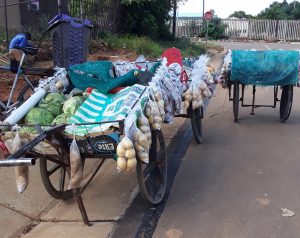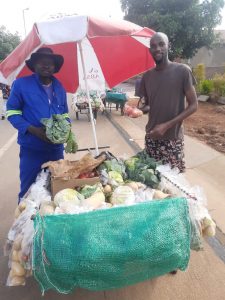
Fresh vegetable produce sold by one of the trolley sellers in Ivory Park. Photo Oscar Sithole.
During his short stay in Soshanguve township in Pretoria, Oscar Sithole, a student at the University of Pretoria (UP), first encountered mobile street traders — or trolley sellers — hawking fresh fruit and vegetables, and his interest was piqued.
So much so, that Sithole, a grantee of the DSI-NRF Centre of Excellence in Food Security (CoE-FS), is now investigating the role played by these trolley sellers in achieving sustainable food systems and food security in Soshanguve. This will form the foundation of his research for his MSocSci Development Studies degree at UP, the co-host institution of the CoE-FS.

For his honours degree, Sithole looked at the contribution of home gardens to rural household food security. Photo Oscar Sithole.
“I developed strong social and economic relations with these roving food traders [and] I was amazed about their innovative enterprise,” said Sithole.
Under-researched role-players
Trolley sellers are an under-researched part of a wider informal food sector in South Africa.
“Interestingly, there is a quite range of scholars like Jane Battersby, Michael Rudolph, Caroline Skinner, Vanessa Watson, Stephen Greenberg, Mike Rogan and others, who write about the role of the informal sector in ensuring food accessibility in low-income communities in South Africa.
“But [none] of them mention trolley sellers, albeit their ubiquitousness in many townships in Gauteng,” said Sithole.
This served as further motivation for the 26-year-old to look at the group of street traders he had come to know, while “mapping their role in ensuring food security [and] food accessibility in the township context”.
To broaden the work, Sithole will also make comparisons with other trolley sellers around Gauteng, based in the Johannesburg CBD, Ivory Park, and Marabastad in Pretoria.
CoE-FS support
As a grantee, Sithole receives funding and supervisory support from the CoE-FS, which is jointly hosted by UP and the University of the Western Cape (UWC).

Sithole was part of the UP/CoE-FS team that conducted a study on the impact of COVID-19 on black smallholder farmers. Photo Oscar Sithole.
The MSocSci candidate and honorary Golden Key member was encouraged to pursue his line of research, and introduced to the CoE-FS, by Dr Marc Wegerif, senior lecturer and researcher in UP’s Anthropology, Archaeology and Development Studies department. Dr Wegerif is also the lead on the CoE-FS’s Urban Food Systems project.
Dr Wegerif, who guided Sithole through his honours degree (which was awarded in 2021 with distinction), has again taken on the role of supervisor.
“He has been a lynchpin in the whole process from the scholarship application, linking my research project to the CoE-FS, and supervision,” said Sithole.
On the broader support given by the CoE-FS, Sithole notes that it’s provided him with the platform to share his research and to connect with scholars who are pursuing similar lines of inquiry.
“As part of the CoE-FS, I have already shared my work in the monthly meetings we normally have, and I have received numerous comments, reviews, suggestions and recommendations from both peers and seniors on things like my research outputs, which areas I should give more priority [to], the gaps I should fill in, and [additional] significant information.”
Process and prep
Having just received his ethics clearance, Sithole is now in the process of finalising the literature review for his research report, and has begun his data collection with the first round of interviewees.
And while that’s all underway, Sithole will also be preparing to share his work in one of the upcoming #FoodTalks dialogues, hosted by Dr Wegerif, as part of the Urban Food Systems project.
“I’m looking forward to it,” said Sithole.
related Articles
PhD funding opportunity: Land governance and responsible value chain management in the...
Photo Tim Mossholder/Pexels. Please liaise with your institution’s research/postgraduate office about the institution’s internal closing date. The onus is on…
Food, power, and inequality: Vision for a fairer food system
Oscar Sithole is a PhD candidate at the University of Pretoria, and a grantee of the CoE-FS. Photo EYEscape/CoE-FS. Oscar…
Dr Mondli Masanabo’s path of passion, perseverance, and purpose
Dr Mondli Masanabo graduated with a PhD in Food Science from CoE-FS co-host, the University of Pretoria. Photo EYEscape/CoE-FS. When…



